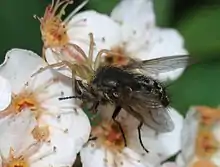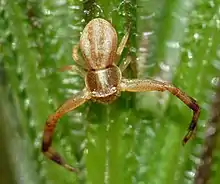Runcinia grammica
Runcinia grammica (sometimes also referred to as Runcinia lateralis)[1] is a species of spiders of the genus Runcinia, with a distribution of "Europa, Near East to Iran, Russia, Central Asia, China, Japan. Introduced to St. Helena, South Africa."[2]

| Runcinia grammica | |
|---|---|
 | |
| Scientific classification | |
| Domain: | Eukaryota |
| Kingdom: | Animalia |
| Phylum: | Arthropoda |
| Subphylum: | Chelicerata |
| Class: | Arachnida |
| Order: | Araneae |
| Infraorder: | Araneomorphae |
| Family: | Thomisidae |
| Genus: | Runcinia |
| Species: | R. grammica |
| Binomial name | |
| Runcinia grammica (C. L. Koch, 1837) | |
The species generally lives in peat bogs, fens, and meadows,[3][4] although it has also been known to inhabit urban areas[5] They usually mature to adulthood in the summer.[4] They have short, broad bodies,[6] which are covered in hair and spines.[7] They have clear muscular corrugation on their sides,[7] and, on small raised bumps on their heads, eight small eyes.[6] Males are usually 2.5–3.5mm in length, females 4-6mm.[4] They are predators,[5] and eat various species of insects.[4]
Unlike many spiders, they do not spin a web of any kind. Instead, they prowl on the ground, as well as climbing plants and flowers, to find their prey.[6] They can move forwards, backwards, and sideways.[6]
Runcina grammica has reportedly been sighted in various areas of Southeastern Spain[8] and Southwestern Portugal.[9][10] They are also known to inhabit Armenia, Georgia, Azerbaijan, Caucasus,[11] Italy,[12] India,[7] South Africa, St. Helena,[13][14][15] Turkey,[15][14] France,[16] and in the Carpathian Basin.[17] They are among the most common species of spiders in Portugal.[14] They are one of the many species preserved at the Mountain Zebra National Park, in South Africa.[18]
References
- "Fauna Europaea". Faunaeur.org. Archived from the original on 22 June 2011.
- "Runcinia grammica". Wsc.nmbe.ch. Retrieved 21 August 2017.
- Meadows – Thomisidae. Commanster.eu. Retrieved 22 October 2011.
- "Runcinia grammica". 12 January 2010. Archived from the original on 12 January 2010. Retrieved 24 January 2022.
- Runcinia grammica – Ecologia, Taxonomia, Morfologia, Distribuition. Naturdata.com. Retrieved 22 October 2011.
- Runcinia grammica. Zipcodezoo.com. Retrieved 22 October 2011.
- Records of the Zoological Survey of India, Volume 103, Issues 1–2, published 2004, page 124
- Data Use Agreement – GBIF Portal. Us.mirror.gbif.org (22 February 2007). Retrieved 22 October 2011.
- Portugal Spider Catalogue Archived 22 May 2011 at the Wayback Machine. Ennor.org. Retrieved 22 October 2011.
- "Archived copy" (PDF). Archived from the original (PDF) on 25 July 2011. Retrieved 24 July 2010.
{{cite web}}: CS1 maint: archived copy as title (link) - Runcinia grammica (C. L. Koch, 1837). Caucasus-spiders.info. Retrieved 22 October 2011.
- Runcinia grammica. Comune.pisa.it. Retrieved 22 October 2011.
- 2008 Annual Checklist : Runcinia grammica (C. L. Koch, 1837). Catalogue of Life (5 January 2008). Retrieved 22 October 2011.
- "Archived copy" (PDF). Archived from the original (PDF) on 25 July 2011. Retrieved 21 July 2010.
{{cite web}}: CS1 maint: archived copy as title (link) - "Archived copy" (PDF). Archived from the original (PDF) on 9 March 2012. Retrieved 20 July 2010.
{{cite web}}: CS1 maint: archived copy as title (link) - "Runcinia grammica (C.L. Koch, 1837) - Thomise rayé". Inpn.mnhn.fr. Retrieved 24 January 2022.
- "Archived copy" (PDF). Archived from the original (PDF) on 21 July 2011. Retrieved 24 July 2010.
{{cite web}}: CS1 maint: archived copy as title (link) - "Archived copy". Archived from the original on 19 August 2011. Retrieved 24 July 2010.
{{cite web}}: CS1 maint: archived copy as title (link)